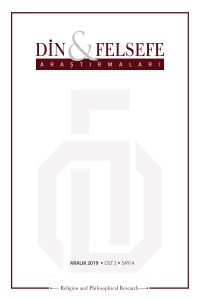Öz
The problem of evil is considered to make a strong challenge against the monotheistic belief
in God. For some philosophers the existence of evil provides a rational ground to argue that there
is no God, even if it does not make up a conclusive proof. In this regard, the evidential argument
from evil devised by William Rowe to reject the existence of God triggered many debates. Rowe
argues that there are instances of intense suffering which could be prevented by God without
sacrificing any good or causing any equal or worse evil. He argues that the existence of such cases
of pointless evil makes it reasonable to reject the existence of God. In this context, I will examine
Rowe’s argument and Stephen J. Wykstra’s response emphasizing that human knowledge is too
limited to decide if those cases of evil are in fact pointless. Examining their position regarding the
interpretation of cases of intense suffering, which appear to be pointless, I will argue that the
existence of evil may not necessarily constitute evidence against the existence of God. This is,
because the position of a person in making sense of the existence of evil is governed by the
previously accepted worldview of this person; but not the other way around. I will relate this
explanation to the story of prophet Job as related in the Qur’an. Prophet Job’s attitude vis à vis the
suffering he experienced seems to be a good example in this regard. Although apparently there was
no reason justifying his suffering, he submitted to God and ask help, instead of rejecting the
existence of God on the basis his suffering.
Anahtar Kelimeler
Willam Rowe Stephen J. Wykstra Problem of Evil The Story of Prophet Job Evidential Argument
Kaynakça
- Fakhr al-Dīn Rāzī, al-Tafsīr al-Kabīr = Mafātīḥ al-Ghayb, vol.22 (Beyrut: Dār al-Kutub al-ʿIlmiyya, 1990/1411).
- J. L. Mackie, “Evil and Omnipotence,” in Problem of Evil, ed. Marilyn McCord Adams and Robert Merrihew Adams (Oxford: Oxford University Pres, 1990).
- Muḥammad Tāhir b. Muḥammad b. Muḥammad al-Tūnusī Ibn ‘Ashūr, Tafsīr al-Taḥrīr wa al- Tanwīr, vol. 17 [no publisher info, no date].
- Philip L. Quinn, “Philosophy of Religion” in The Cambridge Dictionary of Philosophy, ed. Robert Audi, Second Edition (Cambridge: Cambridge University Press, 1999).
- Richard Swinburne, The Existence of God 2nd ed. (Oxford: Clarendon Press, 2004).
- Stephen J. Wykstra, “The Humean Obstacle to Evidential Arguments from Suffering: on Avoiding the Evils of ‘Appearance’,” in Problem of Evil, ed. Marilyn McCord Adams and Robert Merrihew Adams (Oxford: Oxford University Pres, 1990).
- Stephen John Wykstra, “Rowe’s Noseeum Arguments from Evil,” in Evidential Argument from Evil, ed. Daniel Howard-Snyder (Indiana University Press, 1996).
- The Meaning of the Holy Qur’an, trans. A. Yusuf ‘Alī (Leicestershire: The Islamic Foundation, 2009).
- William Rowe, “Evil and the Theistic Hypothesis: A Response to Wykstra,” in Problem of Evil, ed. Marilyn McCord Adams and Robert Merrihew Adams (Oxford: Oxford University Pres, 1990).
- William Rowe, “The Problem of Evil and Some Varieties of Atheism,” in Problem of Evil, ed. Marilyn McCord Adams and Robert Merrihew Adams (Oxford: Oxford University Pres, 1990).
Öz
Kötülük probleminin monoteist Tanrı inancına karşı önemli bir meydan okuma oldu-ğu kabul edilmektedir. Dünyada kötülüğün varlığının, Tanrı’nın yokluğunu isbatlamasa da, Tanrı’nın varolmadığı inancı için aklî bir dayanak tesis ettiği kabul edilir. Kötülüğün varlığın-dan hareketle Tanrı’nın varolmadığını göstermek üzere William Rowe’un kurduğu argüman önemli tartışmaları tetiklemiştir. Rowe, daha büyük bir iyiliğe hizmet ettiğini veya engel-lenmesi durumunda daha büyük bir iyiliğin kaybedileceğini veya daha beter bir kötülüğün meydana gelmesine neden olunacağını göremediğimiz, maksatsız, kötülüklerin var olduğu-nu iddia etmiştir. Varlığını meşrulaştıracak herhangi bir iyiye hizmet ettiği görülmeyen bu örneklerin Tanrı’nın varlığını reddetmeyi makul kıldığını iddia etmiştir. Bu makalede ben, William Rowe’un kurduğu bu argümanı ve Stephen J. Wysktra’nın bu argümana, getirdiği id-rak sınırlaması itirazını ele alacağım. Ne gibi bir iyiliğe hizmet ettiğini göremediğimiz kötü-lüklerin doğrudan doğruya Tanrı’nın varlığı aleyhine bir delil oluşturmayacağını, her iki filo-zofun yaklaşımını tahlil ederek göstermeye çalışacağım. Maksadını doğrudan doğruya gö-remediğimiz kötülükler karşısında bir kimsenin geliştireceği tavrın önemli ölçüde o kişinin önceden sahip olduğu dünya görüşü tarafından yönlendirildiğini iddia edeceğim. Kur’an’da anlatılan Eyüp peygamberin kıssasında, Eyüp peygamberin yaşadığı sıkıntılar karşısında gös-terdiği tavrın da böyle bir bakışı desteklediğini göstermeye çalışacağım.
Anahtar Kelimeler
Willam Rowe Stephen J. Wykstra Kötülük Problemi Resullerin İşleri Delilci Argüman
Kaynakça
- Fakhr al-Dīn Rāzī, al-Tafsīr al-Kabīr = Mafātīḥ al-Ghayb, vol.22 (Beyrut: Dār al-Kutub al-ʿIlmiyya, 1990/1411).
- J. L. Mackie, “Evil and Omnipotence,” in Problem of Evil, ed. Marilyn McCord Adams and Robert Merrihew Adams (Oxford: Oxford University Pres, 1990).
- Muḥammad Tāhir b. Muḥammad b. Muḥammad al-Tūnusī Ibn ‘Ashūr, Tafsīr al-Taḥrīr wa al- Tanwīr, vol. 17 [no publisher info, no date].
- Philip L. Quinn, “Philosophy of Religion” in The Cambridge Dictionary of Philosophy, ed. Robert Audi, Second Edition (Cambridge: Cambridge University Press, 1999).
- Richard Swinburne, The Existence of God 2nd ed. (Oxford: Clarendon Press, 2004).
- Stephen J. Wykstra, “The Humean Obstacle to Evidential Arguments from Suffering: on Avoiding the Evils of ‘Appearance’,” in Problem of Evil, ed. Marilyn McCord Adams and Robert Merrihew Adams (Oxford: Oxford University Pres, 1990).
- Stephen John Wykstra, “Rowe’s Noseeum Arguments from Evil,” in Evidential Argument from Evil, ed. Daniel Howard-Snyder (Indiana University Press, 1996).
- The Meaning of the Holy Qur’an, trans. A. Yusuf ‘Alī (Leicestershire: The Islamic Foundation, 2009).
- William Rowe, “Evil and the Theistic Hypothesis: A Response to Wykstra,” in Problem of Evil, ed. Marilyn McCord Adams and Robert Merrihew Adams (Oxford: Oxford University Pres, 1990).
- William Rowe, “The Problem of Evil and Some Varieties of Atheism,” in Problem of Evil, ed. Marilyn McCord Adams and Robert Merrihew Adams (Oxford: Oxford University Pres, 1990).
Ayrıntılar
| Birincil Dil | İngilizce |
|---|---|
| Konular | Felsefe |
| Bölüm | Araştırma Makalesi |
| Yazarlar | |
| Yayımlanma Tarihi | 31 Aralık 2019 |
| Yayımlandığı Sayı | Yıl 2019 Cilt: 2 Sayı: 4 |


